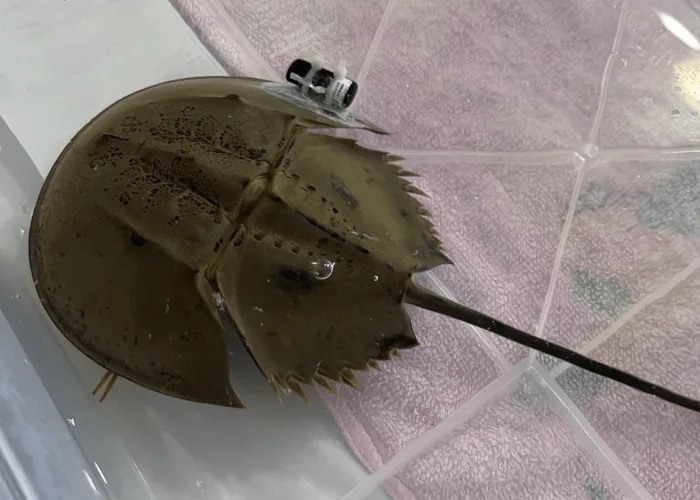Hong Kong’s Ocean Park Launches Horseshoe Crab Tracking Scheme

Hong Kong's Ocean Park has taken a significant step towards safeguarding the local horseshoe crab population by launching an unprecedented tracking scheme.
This pioneering initiative aims to support the Hong Kong government in its development and conservation endeavours. The park's conservation foundation recently released four tagged horseshoe crabs into the waters near the city's airport, enabling scientists to monitor their movements.
Howard Chuk Hau-chung, director of the park’s foundation, emphasised the importance of Hong Kong as a vital habitat for horseshoe crabs while acknowledging the challenges they face. Destruction of their mudflat habitats has impacted young horseshoe crabs, while adult crabs often fall victim to entanglement in marine debris like abandoned nets, leading to their untimely demise.
To gather comprehensive data on the crabs' behaviour, the foundation has deployed an underwater acoustic telemetry system. This system comprises four receivers covering a total area of 3 sq.. km (1.15 square miles). The receivers monitor the crabs' activities, including their locations, ranges, and environmental factors such as water temperature and salinity.
Horseshoe crabs are elusive creatures, making observation in the wild particularly challenging. They migrate to deeper waters upon reaching maturity and only return to beaches for spawning. The first group released as part of the tracking scheme consists of two tri-spine horseshoe crabs and two mangrove horseshoe crabs. The tri-spine variety is considered endangered due to habitat loss and overfishing.
Kevin Laurie, a horseshoe crab expert and partner of the foundation, expressed concern over the decline in Hong Kong's horseshoe crab population. He cited the development of Hong Kong International Airport on Chek Lap Kok island and commercial fishing activities in the 1980s as major contributing factors to this decline.
The tracking scheme, advised by Cheung Siu-gin, an associate professor of chemistry at City University, aims to provide crucial insights into the crabs' behaviour, including their spawning locations, foraging habits, and winter habitats. By offering concrete facts about horseshoe crab behaviour and their ecological needs, the project equips the government with valuable information for informed decision-making when it comes to Hong Kong’s ecological policies.
Get the latest curated content with The Beat Asia's newsletters. Sign up now for a weekly dose of the best stories, events, and deals delivered straight to your inbox. Don't miss out! Click here to subscribe.
Most Popular in Hong Kong
Hong Kong's Food Waste Problem and What We're Doing About It

Hong Kong Government Set to Test E-Ferries from Early 2024: Reports

What is Upcycling and How it Benefits the Community and Environment?

Sustainable Green Buildings in Hong Kong Setting Architecture Trends

GreenPrice's CEO Terence Hon is Leading Hong Kong's Food Revolution

Trending in Hong Kong
Who is the TikTok Tailor? The Viral Roshan Melwani of Sam’s Tailor in HK

The True Story of Mr. Wongs: Student Food and Booze Paradise

Best Streetwear Stores in Hong Kong

Cheap Shopping Spots in Hong Kong for Bargains and Cool Finds on a Budget

Eight Best Cha Chaan Tengs in Hong Kong: Swiss Cafe, Kam Wah, Lan Fong Yuen

